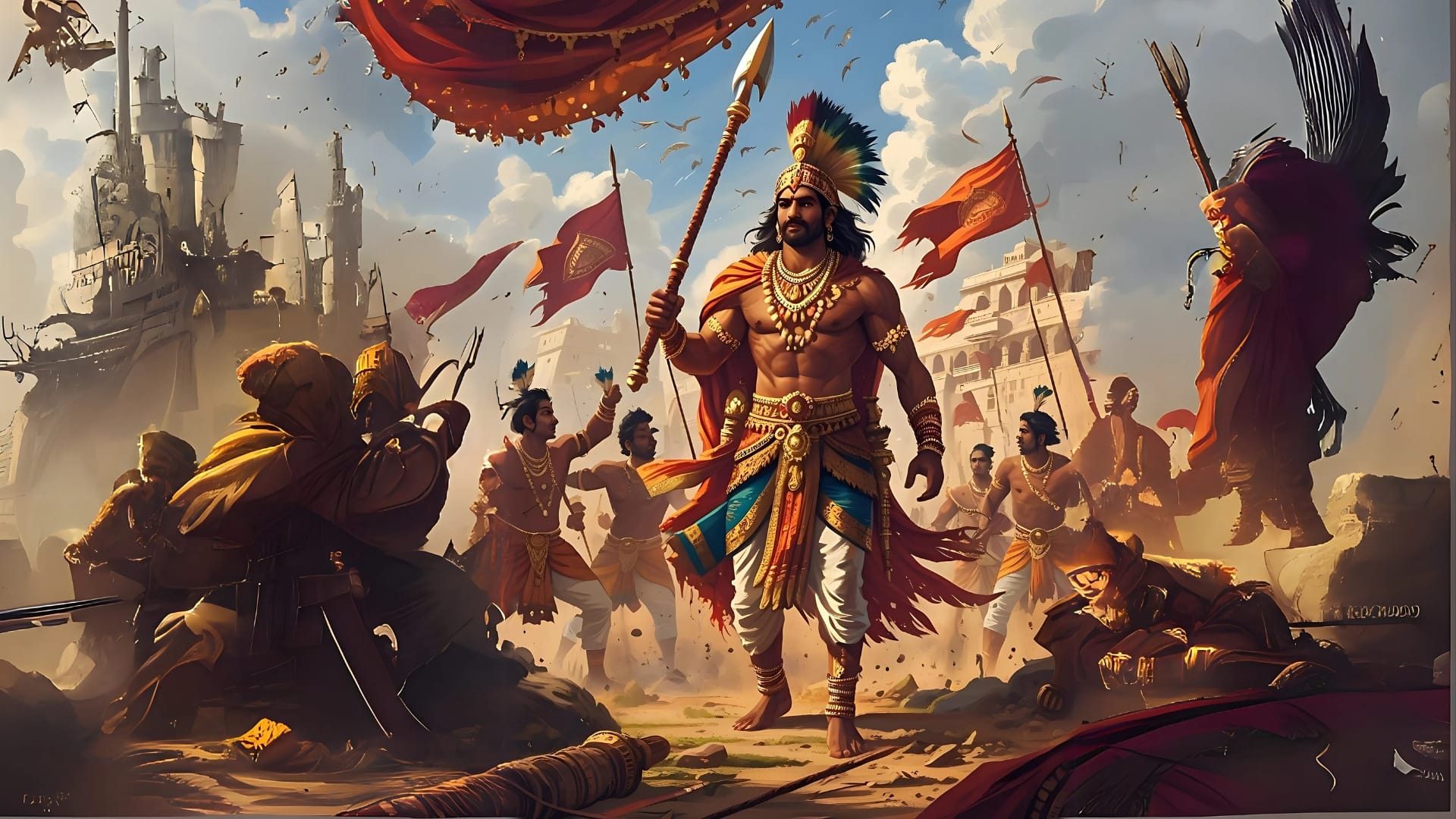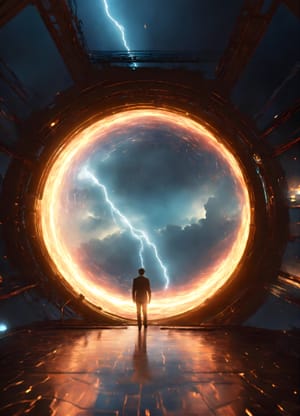Part 1: The Shadowless King
The first rain of the monsoon came not as a blessing, but as a warning.
In the heart of the valley, where the river Sharvani curved like a silver serpent, stood the great kingdom of Vishanthala. Known for its towering temple spires, golden chariots, and the chants of saints that echoed through the dawn mist, Vishanthala was a place where gods were once said to walk with men.
King Dharanivarsha, the ruler of this ancient land, was a man of wisdom and restraint. In his younger years, he had led armies to victory, tamed wild beasts, and written sacred verses by the light of oil lamps. But now, his face bore the lines of time and his heart the weight of secrets. To the people, he was still their noble guardian, yet few knew that behind the palace walls, a silent curse had begun to take root.
It started on the night of the Red Moon.
The royal astrologer, trembling as he read the stars, had whispered of a forgotten prophecy buried deep in the temple scrolls: "He who forgets Dharma shall awaken the Slumbering Curse." The king had laughed it off then, drinking sweetened coconut water and waving the warning away. But three nights later, something changed. The King’s reflection vanished.
No mirror, no pond, no polished bronze surface would show his face. His shadow disappeared too, vanishing under sunlight as though the gods had chosen to unmark him from existence.
Panic was not an option. Only the high priest and the Queen Mother, Rukmini Devi, were informed. They performed every rite, chanted every ancient hymn, summoned sages from the far corners of Bharatavarsha—but nothing could bring back the King's reflection.
Then came the decay.
Not of flesh—but of soul. The king’s memory began to fray. He would forget names, speak in riddles, and sometimes sit for hours staring at the wall, whispering to someone unseen. His cat, Ratha, once a silent palace guardian, now hissed every time it neared him. The birds stopped singing in the royal courtyard.
It was Rukmini Devi who remembered the old vow. Forty years ago, before Dharanivarsha ascended the throne, he had visited the forbidden forest of Aghorya and sought blessings from a tantric sage. In exchange for kingship, he had vowed never to shed innocent blood and never to silence truth with power.
But time twists even the purest intentions. In the recent war with the mountain tribes, hundreds of innocents had died under his orders. And a beloved palace priest had vanished after speaking against the court. The vow had been broken.
The Slumbering Curse had awoken.
Far away, in a quiet village bordering the northern jungles, a young man practiced swordplay in solitude. Prince Aryan. Tall, with fire in his eyes and silence in his heart, Aryan had abandoned court life years ago. Disillusioned by politics and bloodshed, he chose the company of nature over nobles.
One night, a message arrived by an owl—unusual even by royal standards. A letter sealed with the symbol of the Eternal Eye, a secret sign used only in times of great danger. Aryan opened it and read the words from his mother, Queen Rukmini Devi:
"Your father is vanishing. Not in body, but in soul. Come home. The time of karma is upon us."
The prince looked up at the dark sky, feeling the air stir with something strange. The leaves rustled though there was no wind. The fire beside him flickered blue. Something ancient had begun.
And deep in the dungeons beneath Vishanthala, chained in iron laced with mantras, a creature with eyes like molten gold smiled. "The prince is coming," it growled. "Let the games begin."
Part 2: The Whispering Woods
The royal horse galloped through the wet plains, cutting across fields soaked in the monsoon’s fury. Prince Aryan rode with purpose, his cloak clinging to him, soaked by the rain, his eyes fixed on the distant horizon where the towers of Vishanthala would soon rise. But his journey was not direct. As instructed by the scroll’s hidden second page, written in red ink only visible under moonlight, Aryan had to first pass through Tapovana—a forest said to be alive.
Tapovana was no ordinary jungle. It was believed to be cursed, blessed, and haunted all at once. Long ago, rishis had meditated there until their bodies turned to ash and merged with the soil. Their memories, their karma, their questions, had become part of the trees. The forest whispered—not with the wind, but with memory.
Aryan stood at the edge of the woods as thunder cracked above. The air smelled of earth and something ancient—something watching.
As he took his first step inside, the rain stopped. Not faded—stopped. Time itself seemed to hold its breath.
“Prince Aryan,” came a dry voice, from nowhere and everywhere.
Aryan turned, sword drawn, eyes scanning the dark foliage. From behind an old peepal tree, a hunched figure emerged—draped in rags, blindfolded with crimson cloth, and skin dark as bark. She held a crooked staff that glowed faintly with symbols that rearranged themselves when looked at.
“I am Rahi, the eyes that see without seeing,” she said. “I have waited thirty years for you.”
“How do you know me?” Aryan asked, still holding his blade firm.
“I don’t,” she grinned, revealing teeth like cracked ivory. “But the forest does. And the forest remembers everything.”
With no other path and danger pressing, Aryan followed her deeper into Tapovana. As they walked, the trees began to whisper—not with words, but with feeling. He felt guilt, love, anger, jealousy… emotions that weren’t his own. They came like waves, echoing through the roots and branches, showing him fleeting images of past lives, battles, betrayals, births. Time in the forest moved differently—at moments fast as lightning, at others slow as dripping honey.
At a clearing, Rahi stopped. A twisted tree, leafless and dead, stood tall in the center, its bark carved with thousands of symbols—some in Sanskrit, others in languages lost to the world. She placed her hand on it.
“This,” she said, “is the Vriksha of Karma. Every soul’s actions are recorded here. Your father’s vow, his breaking of it, and the awakening of the Slumbering Curse—it is all here.”
Aryan stepped closer. A branch stretched out slowly, creaking as it extended toward him. When he touched it, a pulse surged through his hand and into his mind.
He saw his father, years younger, kneeling before a tantric sage in a clearing much like this one. The sage had a third eye drawn in blood and held a skull bowl steaming with black smoke.
“Take the vow, Dharanivarsha,” the sage had said. “But break it—and your soul will rot before your flesh.”
Aryan gasped and stepped back, breathing hard.
“Now you know,” said Rahi. “Your father’s karma is not his alone. Blood runs in rivers, but karma runs in silence.”
A deep growl echoed from the treetops. The skies darkened again.
“They have come,” Rahi said.
From the mist, creatures began to emerge—Vanyasuras, forest demons made of vines, bones, and shadows. Sent by the Demon Queen Savanti, they were scavengers of cursed souls.
Aryan drew his sword.
“No,” Rahi whispered. “Steel won’t work. Only truth will.”
Aryan stepped forward, lowering his blade, unsure of what that meant. The first Vanyasura charged. Instead of striking, Aryan looked into its glowing eyes and whispered, “I know you were once a man.”
The creature stopped.
“I know you were once betrayed.”
The vines fell from its body. A broken spirit stepped free and vanished into light.
Rahi smiled. “Good. You are beginning to see.”
The remaining creatures fled, melting into mist.
That night, they sat by a blue fire, and Rahi told Aryan of the journey ahead.
“To break the curse, you must walk the path of Aatman Yatra—the journey of the soul. You will meet three who carry the keys: a Rakshasa who seeks redemption, a Yogini who remembers the stars, and a Saint who became a demoness.”
“And where do I begin?” Aryan asked.
Rahi pointed east, beyond the hills.
“Seek the Rakshasa named Grahak, bound in chains beneath the ruins of Bhuvanesh Fort. He once ate men. Now he fasts in silence, dreaming of light.”
Aryan nodded. The path ahead was far from over. But for the first time, he felt something awaken within him—not rage, not vengeance, but clarity.
As the night deepened, the forest fell silent again.
And miles away, in the lair of Demon Queen Savanti, a mirror cracked. She looked up, eyes burning red.
“The prince has touched the Vriksha,” she hissed. “Let the real hunt begin.”
Part 3: The Rakshasa’s Chains
The ruins of Bhuvanesh Fort stood like a wounded beast—its spine broken, its towers crumbling, its silence thick with forgotten screams. Once a mighty stronghold of the southern kings, it had been cursed and abandoned after the massacre of its royal guards during a mysterious blood moon centuries ago. Now, only vultures circled above and the wind whispered stories of madness.
Prince Aryan arrived as the sun dipped behind the hills, casting the fort’s jagged remains in a crimson glow. The gates were half-buried in vines, and the stone was cracked with time. The place seemed to breathe—slow and heavy, like something asleep but listening.
Inside, the air turned cold. Aryan lit a torch, its flame flickering oddly in the dark corridors. Symbols—ancient, wild, and unfinished—lined the walls like graffiti from forgotten tongues. Then came the sound: a deep hum that rose and fell like chanting from beneath the earth.
He followed the sound down into a cavern carved into the mountain’s roots. At the center of the hollow chamber, surrounded by glowing chains and a circle of salt etched with mantras, sat a monstrous figure—eight feet tall, with skin like stone, and eyes shut tight in meditation.
“Grahak,” Aryan said.
The creature opened his eyes. They were not filled with rage, but sorrow.
“I have waited for you, son of the curse-breaker,” the Rakshasa said, voice like a slow avalanche.
Aryan stepped closer. “You once destroyed villages. Why should I believe you seek light now?”
“I did. But I was not born a Rakshasa. I was once human. A saint. My fall came when I touched forbidden knowledge—tantra beyond balance. I became what I feared, and I feasted on those I swore to protect.”
He looked down at his chained hands.
“For two hundred years I have fasted. Meditated. Burned in the fire of regret. The chains are not prison—they are reminder.”
Aryan slowly lowered his sword. “Then help me. My father’s curse—”
“I know,” Grahak interrupted. “I saw the moment it began. I saw him choose war over justice. But I also saw his tears in silence. Karma is not punishment, Prince. It is memory. And memory seeks balance.”
The Rakshasa reached into the air—and a glowing lotus appeared.
“This is your first key,” he said. “Not a weapon, but a question. When the time comes, ask it: ‘What did I forget?’”
Aryan took the lotus. It pulsed with warmth.
Just then, the chains around Grahak shuddered.
“Leave, now,” he growled. “She knows you are here.”
From the darkness, a shriek erupted—high, inhuman, filled with rage. A shadow slithered across the walls. It was Savanti’s wraith, a formless demon made of pain and ash, sent to stop Aryan before he could complete the Aatman Yatra.
Aryan ran through the tunnels, dodging falling stone and claws of smoke. As he reached the entrance, he turned one last time. Grahak looked at him and smiled.
“Remember me as a man who fell,” he said, “but chose to rise in silence.”
The entrance collapsed behind Aryan. Dust settled. The wraith was buried.
Outside, dawn broke. The prince stood breathless, clutching the lotus.
Two keys remained. But now, he no longer doubted the path.
Far away, in a hidden cave beyond the ocean cliffs, a young woman in white sat cross-legged, eyes closed. Stars flickered above her head—not in the sky, but circling her crown. She opened her eyes and whispered:
“The prince has the first lotus. Let him come.”
Part 4: The Yogini Who Remembered the Stars
Beyond the cliffs of the western coast, where the winds sang hymns of lost sailors and the ocean beat its chest against the jagged rocks, lay the ancient monastery of Shataranika. Carved into the cliff-face itself, it was hidden from maps and mortal eyes—shielded by illusion and protected by silence. Few even knew it existed. Fewer had ever reached it.
Prince Aryan stood now at its threshold.
The sea howled behind him as he climbed the narrow path that wrapped around the cliff like a serpent. The lotus Grahak had given him glowed faintly, leading the way. When he reached the gate—an arch of star-shaped stone with constellations carved into its surface—it opened by itself.
He entered a chamber lit by nothing, yet not dark. The walls shimmered like the night sky. In its center sat a young woman draped in white robes, eyes closed, breathing in rhythm with the stars that floated gently around her.
“Are you the Yogini?” Aryan asked.
She opened her eyes.
They held the sky.
“I was once,” she said softly. “Now, I only remember.”
Aryan stepped forward. “I need the second key.”
The woman stood. “Then remember with me.”
Without warning, she touched his forehead. The world turned upside down.
Aryan was no longer standing. He was falling—into memories not his own. He saw battles on moons made of crystal, chanting saints floating above fire, and temples that bent time. He saw his own face—but older, younger, in other forms. He saw lifetimes.
He awoke in a temple garden. Beside him sat the Yogini.
“You were once a star, Prince Aryan,” she said. “You chose to be born again and again, seeking truth.”
“Why?” he asked.
“To find the part of yourself that was never born, and never dies.”
She handed him a silver conch, shimmering with liquid starlight.
“This is the second key,” she said. “It carries your voice across all lifetimes. When the demoness Savanti offers you illusion, blow this. It will remind you who you are.”
Aryan held it carefully. “Will I see you again?”
The Yogini smiled. “You always do. In dreams. In stars. In silence.”
Suddenly, a storm rose outside the temple. The cliff shook. A shadow passed overhead.
“Savanti has unleashed the Garudan Bhuta,” the Yogini whispered. “A sky demon that hunts souls walking toward light.”
Aryan stood. “Let it come.”
He ran out, the conch in one hand, the lotus in the other. Above him, a winged monster with burning eyes screamed across the sky, searching.
But Aryan did not run.
He stood still, closed his eyes, and blew the conch.
A note pure as dawn echoed across land and sea. The sky demon faltered, howled, and vanished into wind.
The Yogini watched from within, tears glistening.
“The soul remembers,” she said.
Far away, in her obsidian palace beneath the desert sands, Queen Savanti shattered a ruby with her bare hand.
“Two keys?” she snarled. “Then let him meet what I became.”
Part 5: The Saint of the Black Flame
The desert of Kharadham spread like an endless ocean of ash—its dunes dark, its winds howling like ghosts that had forgotten their names. Here, buried beneath sand and cursed mantras, stood the obsidian palace of Savanti, Queen of Shadows, once a saint who had walked with gods.
Prince Aryan crossed the final stretch alone. The lotus from Grahak pulsed warmly at his chest. The conch from the Yogini shimmered in his hand. And in his heart burned a question he could no longer avoid: What did I forget?
He entered the palace gates carved from black glass. The halls were lined with mirrors that showed not reflections, but fears—his childhood doubts, his father’s cruelest moments, his mother’s quiet sorrow.
Savanti awaited him on a throne of serpent bones. Her beauty was unnatural, ageless, but her eyes betrayed centuries of sorrow twisted into cruelty.
“Welcome, seeker of light,” she purred. “You look like him.”
“My father?” Aryan asked.
“No,” she said, standing. “The one you were before. When we both were stars.”
Aryan stood firm. “I came to end the curse. Release his soul.”
Savanti laughed—a sound like broken glass. “Your father’s curse is not his alone. It was I who gave him the vow. It was I who watched him forget. And it is I who will decide if he returns.”
Aryan raised the lotus.
Savanti hissed.
“You think redemption is a flower?”
Aryan closed his eyes. “No. It’s a choice.”
He stepped forward and blew the conch.
The palace trembled. Light poured from its walls. And Aryan spoke, his voice steady:
“I remember now. I was not born for war. I was not born to rule. I was born to awaken what others forget—truth, dharma, and the light within.”
Savanti screamed. Her form twisted—her saintly shape flickering with demonic wings and horns. But instead of striking, Aryan looked into her eyes.
“I forgive you,” he said.
She froze.
“No one ever said that,” she whispered.
And then, like a shadow that remembers the sun, she began to fade.
The curse lifted.
Far away, in Vishanthala, King Dharanivarsha woke from his trance. His reflection returned. His shadow stretched beside him for the first time in months. He wept.
When Aryan returned, the people cheered—but he did not stay.
He handed the throne back to his father and walked into the eastern hills, where silence awaited. For his journey was not toward power, but peace.
The Vriksha of Karma in Tapovana grew one new leaf.
And high above, in the stars, two souls once separated glowed side by side again.







